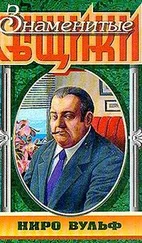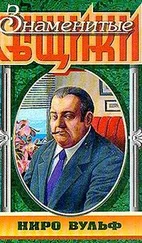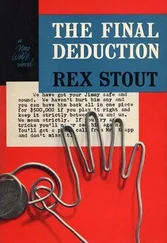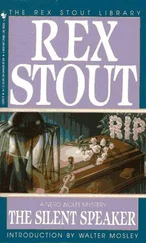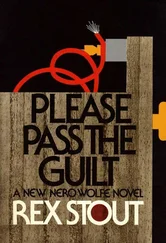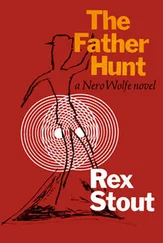“At the moment I don’t care a damn who gets away with what.” Hombert was a little exasperated. “I care about just one thing, getting this case solved, and if that doesn’t happen soon I may not have any subordinates. Get back on the job and phone me if there’s anything new.”
“Yes, sir.” Ash crossed to Wolfe, who was seated, until their toes touched. “Some day,” he promised, “I’ll help you lose some weight.” Then he strode out of the room.
I returned to my chair. Skinner had already returned to his. Hombert stood looking at the door that had closed behind the Inspector, ran his fingers through his hair, shook his head slowly a few times, moved to his own chair behind his desk, sat, and lifted a receiver from its cradle. In a moment he spoke into the transmitter:
“Bailey? Have that warrant for the arrest of Nero Wolfe as a material witness vacated. Right away. No, just cancel it. Send me—”
“ And the search warrant,” I put in.
“Also the search warrant for Nero Wolfe’s house. No, cancel that too. Send the papers to me.”
He hung up and turned to Wolfe. “All right, you got away with it. Now what do you know?”
Wolfe sighed deep. A casual glance at his bulk might have given the impression that he was placid again, but to my experienced eye, seeing that he was tapping the arm of his chair with his middle finger, it was evident that there was still plenty of turmoil.
“First,” he muttered, “I would like to learn something. Why was Mr. Cramer demoted and disgraced?”
“He wasn’t.”
“Nonsense. Whatever you want to call it, why?”
“Officially, for a change of scene. Off the record, because he lost his head, considering who the people are that are involved, and took on a bigger load than the Department could handle. Whether you like it or not, there’s such a thing as sense of proportion. You cannot treat some people like a bunch of waterfront hoodlums.”
“Who brought the pressure?”
“It came from everywhere. I’ve never seen anything like it. I’m giving no names. Anyhow, that wasn’t the only reason. Cramer was muffing it. For the first time since I’ve known him he got tangled up. Here at a conference yesterday morning he couldn’t even discuss the problem intelligently. He had got his mind fixed on one aspect of it, one little thing, and that was all he could think of or talk about — that missing cylinder, the tenth cylinder that may or may not have been in the leather case Boone gave to Miss Gunther just before he was murdered.”
“Mr. Cramer was concentrating on that?”
“Yes. He had fifty men looking for it, and he wanted to assign another fifty to it.”
“And that was one of your reasons for removing him?”
“Yes. Actually the main reason.”
Wolfe grunted. “Hah. Then you’re an imbecile too. I didn’t know Mr. Cramer had it in him to see that. This doubles my admiration and respect for him. Finding that cylinder, if not our only chance, is beyond all comparison our best one. If it is never found the odds are big that we’ll never get the murderer.”
A loud disgusted snort came from Skinner. “That’s you all right, Wolfe! I suspected it was only fireworks. You said you’ve already got him.”
“I said nothing of the sort.”
“You said you know who it is.”
“No.” Wolfe was truculent. Having been aroused to the point of committing assault and battery, he had by no means calmed down again. “I said I know something that gives me a good clear idea of the murderer’s identity, and I also said that you people know it too. You know many things that I don’t know. Don’t try to pretend that I bulldozed you into ejecting Mr. Ash and releasing me from custody by conveying the impression that I am prepared to name the culprit and supply the evidence. I am not.”
Hombert and Skinner looked at each other. There was a silence.
“You impervious bastard,” Skinner said, but wasting no energy on it.
“In effect, then,” Hombert said resentfully, “you are saying that you have nothing to tell us, that you have nothing to offer, that you can’t help us any.”
“I’m helping all I can. I am paying a man twenty dollars a day to explore the possibility that Miss Gunther broke that cylinder into little pieces and put it in the rubbish receptacle in her apartment in Washington. That’s going to an extreme, because I doubt if she destroyed it. I think she expected to use it some day.”
Hombert shifted impatiently in his chair as if the idea of hunting for a lousy cylinder, possibly broken anyhow, only irritated him. “Suppose,” he said, “you tell us what it is we all know that gives you a good clear idea of who the murderer is, including the who. Off the record.”
“It isn’t any one thing.”
“I don’t care if it’s a dozen things. I’ll try to remember them. What are they?”
Wolfe shook his head. “No, sir.”
“Why not?”
“Because of your idiotic treatment of Mr. Cramer. If it seemed to make sense to you, and I believe it would, you would pass it on to Mr. Ash, and heaven knows what he would do. He might even, by pure chance, do something that would result in his solving the case, and I would stop short of nothing to prevent that outcome.” Wolfe’s middle finger started tapping again. “Help Mr. Ash to a triumph? God forbid!” He frowned at Hombert. “Besides, I’ve already given you the best advice I’ve got. Find that cylinder. Put a hundred men on it, a thousand. Find it!”
“We’re not neglecting the damn cylinder. How about this, do you think Miss Gunther knew who killed Boone?”
“Certainly she did.”
Skinner broke in. “Naturally you’d like that,” he said pessimistically, “since it would eliminate your clients. If Miss Gunther knew who it was, and it was an NIA man, she would have handed it to us on a platter. So if she did know, it was and is one of the other four — Dexter or Kates or one of the Boone women.”
“Not at all,” Wolfe contradicted him.
“But damn it, of course!”
“No.” Wolfe sighed. “You’re missing the whole point. What has been the outstanding fact about this case for a whole week now? What was its peculiar characteristic? This, that the public, the people, had immediately brought the case to trial as usual, without even waiting for an arrest, and instead of the customary prolonged disagreement and dissension regarding various suspects, they reached an immediate verdict. Almost unanimously they convicted — this was the peculiar fact — not an individual, but an organization. The verdict was that the National Industrial Association had murdered Cheney Boone. Now what if you were Miss Gunther and knew who had killed Boone? No matter how you knew, that’s another question; the point is that you knew. I think she did know. Let’s suppose she knew it was young Mr. Erskine. Would she have exposed him? No. She was devoted to the interests of her own organization, the BPR. She saw the rising tide of resentment and indignation against the NIA, constantly increasing in force and intensity. She saw that it might result, if sustained long enough, in completely discrediting the NIA and its purposes, policies, and objectives. She was intelligent enough to calculate that if an individual, no matter who, were arrested for the murder with good evidence, most of the resentment against the NIA would be diverted away from it as an organization.”
Wolfe sighed again. “What would she do? If she had evidence that pointed to Mr. Erskine, or to anyone else, she would suppress it; but she wouldn’t destroy it, for she wouldn’t want the murderer eventually to escape his punishment. She would put it where it wouldn’t be found, but where she could retrieve it and produce it when the time came, when the NIA had been sufficiently damaged. It is not even necessary to assume loyalty to the BPR as her dominating motive. Suppose it was personal devotion to Mr. Boone and a desire to avenge him. The best possible revenge, the perfect revenge, would be to use his death and the manner of it for the discomfiture and the destruction of the organization which had hated him and tried to thwart him. In my opinion Miss Gunther was capable of that. She was a remarkable young woman. But she made the mistake of permitting the murderer to learn that she knew who he was, how is still another question, and that she paid for.”
Читать дальше

